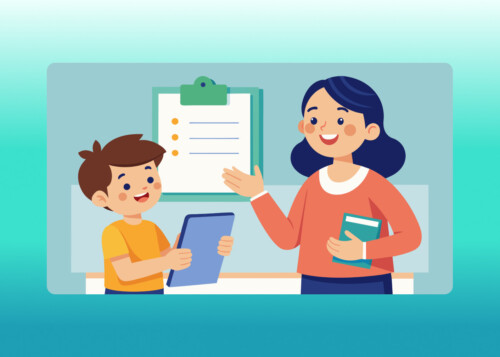It was October of my first year of teaching, and my students and I were finally starting to hit our stride. Our classroom had been arranged and rearranged, our routines were falling into place, and our relationships with one another were starting to blossom. One thing was looming ahead of us, though–parent-teacher conferences.
As a student teacher, I had a single experience helping with parent-teacher conferences in the classroom next door, and my mentor teacher was close by the whole time. This year, I was going to be on my own, and I was simultaneously nervous and overwhelmed. I amassed stacks of assessment data for each of my students, which covered my desk in precariously perched piles. I found the perfect resources to share on 5-and 6-year-old milestones in handwriting, social-emotional skills, and early literacy. When the night of parent-teacher conferences came, I’d even baked a special treat for my families to take home. Despite my preparedness, I was still incredibly nervous.
Fast-forward four hours, and I was done. Beyond just surviving my first round of conferences, I’d actually enjoyed them! I had productive conversations with parents, learned more about what made their children tick, and collaborated on some necessary action steps moving forward. It was also nice to finally put faces to some of the names I’d been speaking with via our school’s app. Driving home that night, I was far less nervous at the thought of returning for round two the next day.
As a new teacher, your first parent-teacher conferences can seem daunting. While student teaching provides us with ample opportunities to try our hands at lesson planning and working with students, one thing we don’t get much practice with is interacting with parents! And, as recent college graduates, many of us enter this field without yet being parents ourselves. The combination of this dynamic with a lack of direct experience can leave a lot of us fearful in the face of the unknown. So, seven years later, this is what I wish I could tell my first-year-teacher self.
It’s really going to be okay.
Really. In the scheme of your school year, this is one or two nights. Even if you get off on the wrong foot with a parent or have to deliver some less-than-stellar news, you have the rest of the school year to grow and improve, just like your students. I have found that being open with your families and students about the fact that this is your very first year of teaching makes them more willing to extend some grace. And, if you’re an early childhood educator like myself, it may be that you’re all having your first school experience together! There’s something especially sweet about that.
You’ve prepared enough.
One of the best things about being a first-year teacher is that you’ve likely over-prepared in the best of ways! I’m not advocating for overwhelming yourself, but I know you’re covering all your bases. As long as you have assessment data and some individualized comments to share with parents, you’re doing great.
Check in with your grade level team or mentor to see what they share with parents during conferences, then add any “extras” if you have the time or energy. At the end of conference season, make a computer file with any good handouts you found or assessments you used to streamline the process for next year.
You have people in your corner.
Administrators. Your mentor teacher. Your grade-level team. Your specials teachers. There are plenty of people around you to lean on during your first conferences. If you expect one to be particularly contentious, try to arrange for your principal to sit in on it to give you extra support. Alternatively, schedule it at the end of your conference slots so you can take additional time to talk if necessary.
Even outside of conferences, it’s especially important to find people in your school to surround yourself with that support and uplift you. Find the veterans who remember what it is like to be a new teacher. Turn to them for advice or just to lend a listening ear. You’ll be grateful for them on the hardest and the best days.
You are bursting with knowledge!
Sometimes people like to knock first-year teachers for their inexperience. I want to take a different perspective on your first year of teaching. You’re fresh out of college, full of new ideas and the latest research in pedagogy. You completed a four-year degree and passed rigorous licensure tests. While you may not have years of experience under your belt, your first year in your own classroom is a time when you finally get to put your passion for teaching to work!
I believe that there’s never a time when you’re more dedicated and innovative than in your first year of teaching. You’re bringing new knowledge, ideas, and teaching styles to your building, and that’s something to be proud of. When you speak to parents at your conferences, believe that you know what you’re talking about. The combination of your expertise and new-teacher optimism is a superpower.
You’re in control of your conference environment.
You are the one who makes the conference environment a welcoming space for collaboration. This includes environmental factors like lowering fluorescent lights, playing calm music, and making your classroom reflective of your teaching style. This may be the one time parents are physically in your classroom all year, so you can and should put your best foot forward.
You’re also in control of the emotional environment of this conference. You are capable of approaching even less-than-ideal conversations in a measured and professional way. In your first year, you want to succeed by helping your students succeed and communicating this to parents can be reassuring. Treat families as a part of your learning team, and truly listen to their perspectives when coming up with solutions and next steps. They might know just the trick to promoting their child’s engagement in class, and you can share your thoughts on their progress.
When families and teachers work together, it leads to better student outcomes. Read our article for more ways to foster positive, open communication with your students’ families.
It’s okay to change things up next time.
Maybe you realized that sitting in child-sized chairs is uncomfortable for everyone. Maybe you didn’t have enough time to go over your assessment data. Maybe your students’ younger siblings dumped out every bucket of toys in your room. (All of these things happened to me.)
You learn from your mishaps and can come up with a better plan for the next round of conferences! After you finish your final meeting, take a few minutes to write up a few notes on how things went while they’re still fresh on your mind. Put it in that conference file I mentioned earlier, and let it be your guide to making changes in the spring.
One of the biggest changes I made from my fall to spring conferences was making the second round student-led. Rather than sitting and going over assessment data the whole time, I let the students show their parents what they knew in real-time. We still took a few minutes at the end of the conference to chat about their progress and behavior, and I sent home packets with ideas for practicing skills at home. Overall, I found this to be a more relaxed style of conference, so I’d encourage you to see if it would be a good fit for your team, too!
The Takeaway
Don’t let conferences overwhelm you. Come prepared, create a welcoming, comfortable environment, and have confidence in yourself as an educator. Remember that everyone sitting in your room is there for the same reason–to help your students be successful. Know that one fellow educator out there is cheering you on!
- Happy Outside: How to Safely Enjoy Outdoor Play In Winter - January 9, 2025
- The Power and Benefits of Outdoor Play and Exploration - January 6, 2025
- How to Connect with Families Experiencing Homelessness - December 19, 2024





